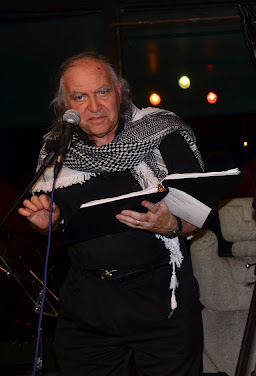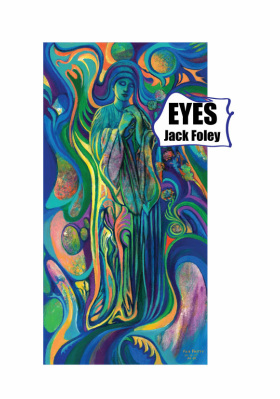 Jack Foley is an innovative, widely-published poet and critic who, with his wife, Adelle, performs his work frequently in the San Francisco Bay Area. He has published eleven books of poetry, seven books of criticism, and a book of translations of the French singer/songwriter, Georges Brassens. Foley’s recent two-volume chronoencyclopedia, Visions & Affiliations: A California Literary Time Line 1940-2005, has received international attention with reviews in both England and the USA. Since 1988, Foley has hosted a poetry radio show on Berkeley station KPFA; his current show, “Cover to Cover” airs every Wednesday at 3 p.m. and is available at KPFA’s archives. His column, “Foley’s Books,” has appeared for many years in the online magazine, The Alsop Review, and he is a Contributing Editor of Poetry Flash. On June 5, 2010, Foley received the Lifetime Achievement Award from the Berkeley Poetry Festival, and June 5, 2010 was proclaimed “Jack Foley Day” in Berkeley. The Fall 2012 issue of the online Tower Journal is a Webfestschrift for Foley; it includes statements about Foley and a sampling of his poetry: vol. 5, no. 1, Tower Journal (www.towerjournal.com; go to Archive). Michael McClure: “Jack Foley is our firebrand experimentalist and he holds his torch high so the reader can have more light.” Dana Gioia: “Jack Foley’s work represents that rare commodity—genuinely avant-garde poetry. He takes the polyphonic forms of Pound and Eliot and pushes them into possibilities open only to performance-based art. This is experimental poetry with depth and intelligence as well as intensity.” EYES is Foley’s selected poems and ranges over fifty years of his writing life. With Clara Hsu he edits Poetry Hotel Press.
Jack Foley is an innovative, widely-published poet and critic who, with his wife, Adelle, performs his work frequently in the San Francisco Bay Area. He has published eleven books of poetry, seven books of criticism, and a book of translations of the French singer/songwriter, Georges Brassens. Foley’s recent two-volume chronoencyclopedia, Visions & Affiliations: A California Literary Time Line 1940-2005, has received international attention with reviews in both England and the USA. Since 1988, Foley has hosted a poetry radio show on Berkeley station KPFA; his current show, “Cover to Cover” airs every Wednesday at 3 p.m. and is available at KPFA’s archives. His column, “Foley’s Books,” has appeared for many years in the online magazine, The Alsop Review, and he is a Contributing Editor of Poetry Flash. On June 5, 2010, Foley received the Lifetime Achievement Award from the Berkeley Poetry Festival, and June 5, 2010 was proclaimed “Jack Foley Day” in Berkeley. The Fall 2012 issue of the online Tower Journal is a Webfestschrift for Foley; it includes statements about Foley and a sampling of his poetry: vol. 5, no. 1, Tower Journal (www.towerjournal.com; go to Archive). Michael McClure: “Jack Foley is our firebrand experimentalist and he holds his torch high so the reader can have more light.” Dana Gioia: “Jack Foley’s work represents that rare commodity—genuinely avant-garde poetry. He takes the polyphonic forms of Pound and Eliot and pushes them into possibilities open only to performance-based art. This is experimental poetry with depth and intelligence as well as intensity.” EYES is Foley’s selected poems and ranges over fifty years of his writing life. With Clara Hsu he edits Poetry Hotel Press.
Read Dana Gioia’s review on Visions and Affiliations.
Read Christopher Bernard ‘s review of EYES in Synchronized Chaos.
by
Ivan Argüelles
Jack Foley’s presence in the Bay Area, nay, Northern California, nay, Whole Earth and Universe poetry scene, both as a poet and a critic, has been duly noted for a good three decades. He is perhaps best known as a star of radio (KPFA) for his weekly show, unfailingly Wednesday afternoons, as a critic through numerous venues on-line and off, and most recently as the author of the really unclassifiable 2-volume Visions & Affiliations: A California Literary Time Line : Poets & Poetry 1940-2005. Much has been deservedly said about this mammoth work, about as inclusive as the London and Paris telephone directories combined. More specifically, and this is how I know Jack, Foley is about as profoundly experimental and important a poet as has manifested on the scene during the last 3 decades. His published poetry, which includes several full length poetry books, notably Adrift and Exiles, is surprising slender considering Foley’s prodigious bardic powers. No one who has been in the audience when Jack (with his wife Adelle) reads–performs is a better word—his poetry can help but be in awe of his poetic gifts. It is not simply that as a performer of the spoken word Jack is tops, but the words, the poems he is bringing to light, are themselves among the most powerful and frequently the most experimental works one is likely to encounter in the contemporary scene. Specifically when Jack and Adelle perform the “choruses,” with their almost schizophrenic dissonance and repetitions, one feels drawn into a shamanistic vortex separating the person from his ordinary skin. I have heard them perform Overture: Chorus (which I think of as the “Hummingbird Chorus”) countless times, and each time is like the first time, an overwhelming power of voices, a polyphony coming at the listener like a magnetic torrent. Suffice to say, there is nothing like such performances in the contemporary poetry world that I know of.Jack Foley, who, as they say, needs no introduction, nevertheless is getting this introduction. First of all, I know of no one else who embodies in his self, in his daily persona, the very stuff of poetry. An almost PhD in English, he knows his subject better, I dare say, than almost any academic in the same field. The rich variety and depth of English poetry from its inception to the post-modern period is at the tip of his tongue. No stranger to virtually any of the schools that practice poetry today, he remains nevertheless the lyric individual of a school all his own. One can point to Duncan, Pound or Joyce as his mental mentors, and in his uncanny way in embracing them he may even surpass them at times, but his range goes far afield from these great modernists. Like Joyce, who had a fine tenor voice and a knack for the popular theater of Dublin, Foley is rooted in vaudeville and tap-dancing, and his interest in American popular music of the earlier 20th century imbues much of his work (e.g. his Gershwin). In fact, Foley’s performances draw very much from that stage tradition. One recalls George Burns and Gracie Allen when watching Jack and Adelle at the mike. And it is this facet, Jack’s insistence on the oral tradition of poetry, that may distinguish him best from his peers. Witness Jack’s own Author’s Note to this book to fully understand the importance of the perceived dichotomy between print and sound, between prose and poetry that is at the root of Foley’s poetry.
But what the reader has in his/her hands is a book called EYES, a book of printed pieces, much of which is recognizable as poetry. So I will focus on what one reads in this assembled text of highly diverse pieces, and the diversity of the various pieces is striking, because this is truly a powerful manifestation of the mind in its manifold directions and personae. As striking evidence of the experimental diversity, one can look at the worksUmm Kulthum or Bridget, Pronounced “Breed,” two pieces that divide down the page, present different typographies or merely sprawl in some places with prose-like blocks across the page. Or look at the Chorus from Tom Jones, with all that prose. Is this a poem? the reader might well inquire. From “Stanzas from Djerassi” or Turning Fortychallenge the reader for the sheer variety of intent and changes of perspective and voice, but all of this is only to remind the reader of the vastness of the world in the waking and sleeping mind, the multiplicity of points of view possible in the myriad instant of light which is breathing within the poet, who may or may not have a single identity. Not all of the pieces in this large “selected” poems are as complex or intellectually challenging as the works I have cited. Many are deceptively simply, even accessible. But this only demonstrates that, like Joyce, Foley is a master of technique, capable of changing his voice in any number of poetic “dialects.” I would argue that EYES is one of the most important works of poetry to have appeared in this still young century. Foley is (to use his words) one of the
Lordly men
leaving the shell of a life
so we may see
the sea
*
EYES is available at Amazon.com.

